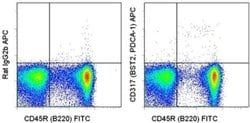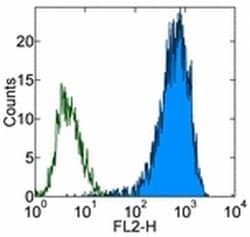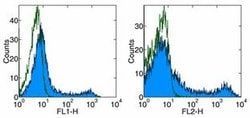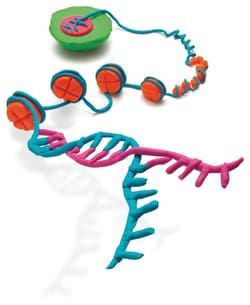17-317-280
CD317 (BST2, PDCA-1) Monoclonal Antibody (eBio927), APC, eBioscience™, Invitrogen™
Manufacturer: Invitrogen
Select a Size
| Pack Size | SKU | Availability | Price |
|---|---|---|---|
| Each of 1 | 17-317-280-Each-of-1 | In Stock | ₹ 11,303.00 |
17-317-280 - Each of 1
In Stock
Quantity
1
Base Price: ₹ 11,303.00
GST (18%): ₹ 2,034.54
Total Price: ₹ 13,337.54
Antigen
CD317 (BST2, PDCA-1)
Classification
Monoclonal
Concentration
0.2 mg/mL
Formulation
PBS with 0.09% sodium azide; pH 7.2
Gene Accession No.
Q8R2Q8
Gene Symbols
Bst2
Purification Method
Affinity chromatography
Regulatory Status
RUO
Gene ID (Entrez)
69550
Content And Storage
4° C, store in dark, DO NOT FREEZE!
Form
Liquid
Applications
Flow Cytometry
Clone
eBio927
Conjugate
APC
Gene
Bst2
Gene Alias
2310015I10Rik; bone marrow stromal antigen 2; bone marrow stromal cell antigen 2; Bst2; BST-2; C87040; CD317; Damp1; DAMP-1; DAMP-1 protein homolog; GREG; HM1.24 antigen; NPC-A-7; PDCA-1; protein DAMP-1; TETHERIN
Host Species
Rat
Quantity
25 μg
Primary or Secondary
Primary
Target Species
Mouse
Product Type
Antibody
Isotype
IgG2b κ
Description
- The eBio927 MAb reacts with PDCA-1 (BST2, CD317), a specific marker of plasmacytoid dendritic cells (pDC), also known as type I IFN-producing cells (IPC) in the naive mouse
- Mouse IPCs are typically CD11c+, CD11b-, B220+, Ly-6C+, and CD62L+
- PDCA-1 is predominantly expressed by IPCs in the naive mouse which represents a very minor population (<0.5%) of splenocytes
- It is upregulated on numerous cell types following stimulation which triggers an IFN response
- PDCA-1 cycles between cell surface and intracellular compartments and may function to regulate trafficking of secreted cytokines
- PDCA-1 (BST2) is the protein recognized by antibody 120G8
- The eBio927 MAb has also been shown to have functional activity
- The epitope recognized by eBio927 is distinct from eBio129c; thus, the antibodies can be used to costain, purify and identify pDCs
- BST2 (CD317, HM1.24 antigen, DAMP-2, tetherin) is an integral membrane protein that is involved in the development and growth of B-cells
- The surface expression of BST2 on fibroblast cell lines facilitated the stromal cell-dependent growth of DW34, a pre-B-cell line
- BST2 is highly expressed during B-cell development, from pro-B precursors to plasma cells, T-cells, monocytes, NK cells and DCs (at protein level), and myeloma cells
- Research studies have shown that BST2 also functions as an inhibitor of retrovirus release from human cells whose activity is antagonized by the HIV-1 accessory protein, Vpu
- While BST2 causes retention of virions on cell surfaces or endocytosis into BST2-positive compartments, its depletion abolished the viral requirement for Vpu for virus release, an activity that may represent a potential therapeutic strategy for the treatment of HIV/AIDS
- Another disease associated with BST2 dysfunction is stomatitis.
Compare Similar Items
Show Difference
Antigen: CD317 (BST2, PDCA-1)
Classification: Monoclonal
Concentration: 0.2 mg/mL
Formulation: PBS with 0.09% sodium azide; pH 7.2
Gene Accession No.: Q8R2Q8
Gene Symbols: Bst2
Purification Method: Affinity chromatography
Regulatory Status: RUO
Gene ID (Entrez): 69550
Content And Storage: 4° C, store in dark, DO NOT FREEZE!
Form: Liquid
Applications: Flow Cytometry
Clone: eBio927
Conjugate: APC
Gene: Bst2
Gene Alias: 2310015I10Rik; bone marrow stromal antigen 2; bone marrow stromal cell antigen 2; Bst2; BST-2; C87040; CD317; Damp1; DAMP-1; DAMP-1 protein homolog; GREG; HM1.24 antigen; NPC-A-7; PDCA-1; protein DAMP-1; TETHERIN
Host Species: Rat
Quantity: 25 μg
Primary or Secondary: Primary
Target Species: Mouse
Product Type: Antibody
Isotype: IgG2b κ
Antigen:
CD317 (BST2, PDCA-1)
Classification:
Monoclonal
Concentration:
0.2 mg/mL
Formulation:
PBS with 0.09% sodium azide; pH 7.2
Gene Accession No.:
Q8R2Q8
Gene Symbols:
Bst2
Purification Method:
Affinity chromatography
Regulatory Status:
RUO
Gene ID (Entrez):
69550
Content And Storage:
4° C, store in dark, DO NOT FREEZE!
Form:
Liquid
Applications:
Flow Cytometry
Clone:
eBio927
Conjugate:
APC
Gene:
Bst2
Gene Alias:
2310015I10Rik; bone marrow stromal antigen 2; bone marrow stromal cell antigen 2; Bst2; BST-2; C87040; CD317; Damp1; DAMP-1; DAMP-1 protein homolog; GREG; HM1.24 antigen; NPC-A-7; PDCA-1; protein DAMP-1; TETHERIN
Host Species:
Rat
Quantity:
25 μg
Primary or Secondary:
Primary
Target Species:
Mouse
Product Type:
Antibody
Isotype:
IgG2b κ
Antigen: __
Classification: __
Concentration: __
Formulation: __
Gene Accession No.: __
Gene Symbols: __
Purification Method: __
Regulatory Status: __
Gene ID (Entrez): __
Content And Storage: __
Form: __
Applications: __
Clone: __
Conjugate: __
Gene: __
Gene Alias: __
Host Species: __
Quantity: 1 Kit (100 Assays)
Primary or Secondary: __
Target Species: __
Product Type: __
Isotype: __
Antigen:
__
Classification:
__
Concentration:
__
Formulation:
__
Gene Accession No.:
__
Gene Symbols:
__
Purification Method:
__
Regulatory Status:
__
Gene ID (Entrez):
__
Content And Storage:
__
Form:
__
Applications:
__
Clone:
__
Conjugate:
__
Gene:
__
Gene Alias:
__
Host Species:
__
Quantity:
1 Kit (100 Assays)
Primary or Secondary:
__
Target Species:
__
Product Type:
__
Isotype:
__
Antigen: __
Classification: __
Concentration: __
Formulation: __
Gene Accession No.: __
Gene Symbols: __
Purification Method: __
Regulatory Status: __
Gene ID (Entrez): __
Content And Storage: __
Form: __
Applications: __
Clone: __
Conjugate: __
Gene: __
Gene Alias: __
Host Species: __
Quantity: 1 Kit (192 Assays)
Primary or Secondary: __
Target Species: __
Product Type: __
Isotype: __
Antigen:
__
Classification:
__
Concentration:
__
Formulation:
__
Gene Accession No.:
__
Gene Symbols:
__
Purification Method:
__
Regulatory Status:
__
Gene ID (Entrez):
__
Content And Storage:
__
Form:
__
Applications:
__
Clone:
__
Conjugate:
__
Gene:
__
Gene Alias:
__
Host Species:
__
Quantity:
1 Kit (192 Assays)
Primary or Secondary:
__
Target Species:
__
Product Type:
__
Isotype:
__
Antigen: CD335 (NKp46)
Classification: Monoclonal
Concentration: 0.2 mg/mL
Formulation: PBS with 0.09% sodium azide; pH 7.2
Gene Accession No.: Q8C567
Gene Symbols: NCR1
Purification Method: Affinity chromatography
Regulatory Status: RUO
Gene ID (Entrez): 17086
Content And Storage: 4° C, store in dark, DO NOT FREEZE!
Form: Liquid
Applications: Flow Cytometry
Clone: 29A1.4
Conjugate: APC
Gene: NCR1
Gene Alias: 1-Mar; activating receptor 1; Ar1; CD335; hNKp46; Kilr1; KILR-1; LY94; Ly-94; lymphocyte antigen 94; Lymphocyte antigen 94 homolog; lymphocyte antigen 94 homolog (activating NK-receptor; lymphocyte antigen 94 homolog (activating NK-receptor; NK-p46); mAR-1; MAR1 (mouse activating receptor 1); mNKp46; natural cytotoxicity triggering receptor 1; Natural killer cell p46-related protein; natural killer cell receptor; Ncr1; NK cell-activating receptor; NK receptor KILR-1; NKACTR; Nkp46; NK-p46; NK-p46); rAR-1; rat-activating receptor 1
Host Species: Rat
Quantity: 100 μg
Primary or Secondary: Primary
Target Species: Mouse
Product Type: Antibody
Isotype: IgG2a κ
Antigen:
CD335 (NKp46)
Classification:
Monoclonal
Concentration:
0.2 mg/mL
Formulation:
PBS with 0.09% sodium azide; pH 7.2
Gene Accession No.:
Q8C567
Gene Symbols:
NCR1
Purification Method:
Affinity chromatography
Regulatory Status:
RUO
Gene ID (Entrez):
17086
Content And Storage:
4° C, store in dark, DO NOT FREEZE!
Form:
Liquid
Applications:
Flow Cytometry
Clone:
29A1.4
Conjugate:
APC
Gene:
NCR1
Gene Alias:
1-Mar; activating receptor 1; Ar1; CD335; hNKp46; Kilr1; KILR-1; LY94; Ly-94; lymphocyte antigen 94; Lymphocyte antigen 94 homolog; lymphocyte antigen 94 homolog (activating NK-receptor; lymphocyte antigen 94 homolog (activating NK-receptor; NK-p46); mAR-1; MAR1 (mouse activating receptor 1); mNKp46; natural cytotoxicity triggering receptor 1; Natural killer cell p46-related protein; natural killer cell receptor; Ncr1; NK cell-activating receptor; NK receptor KILR-1; NKACTR; Nkp46; NK-p46; NK-p46); rAR-1; rat-activating receptor 1
Host Species:
Rat
Quantity:
100 μg
Primary or Secondary:
Primary
Target Species:
Mouse
Product Type:
Antibody
Isotype:
IgG2a κ









